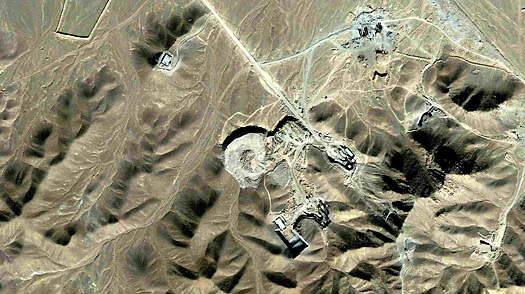|
|
|
Iran’s nuclear facility in the mountains near Qom. |
A new round of diplomatic concessions has come out of the negotiations yesterday between the United Nations’ five permanent members of the Security Council plus Germany (P5+1) and the Islamic Republic of Iran. The biggest news coming out of Geneva is that Iran has agreed to open up its secret enrichment facility outside Qom to IAEA inspectors in the next two weeks. The Islamic Republic has also agreed to send its enriched uranium to Russia, where it will be turned into fuel for a small reactor that produces medical isotopes. At the end of the negotiations, both sides agreed to reconvene at the end of the month for round two.
As is the case with America’s 24-hour news cycle, many wonks have already chimed in with their opinions. Juan Cole argues that the Obama administration “pwned” Bush and Cheney by achieving more in 7.5 hours of negotiations than Bush did in 8 years. Perhaps this is the case, but Cole seems to be ignoring the fact that, like North Korea, the Iranians are notorious for being duplicitous in their nuclear diplomacy.
On the opposite side of the aisle, the Washington Post’s Charles Krauthammer remarked:
“Confusing ends and means, the Obama administration strives mightily for shows of allied unity, good feeling and pious concern about Iran’s nuclear program — whereas the real objective is stopping that program. This feel-good posturing is worse than useless, because all the time spent achieving gestures is precious time granted Iran to finish its race to acquire the bomb.”
Missing from the commentary is a discussion of Turkey’s recent announcement that it will not support additional sanctions against Iran. While the Turks are against the Iranians’ pursuit of a nuclear weapon, their foreign minister, Ahmet Davutoğlu, said that Turkey would be hit hard by a new regimen of sanctions. This is because the Turks are pulling strongly for the construction of the Nabucco pipeline, which will deliver natural gas from the Central Asian Republics and Iran to Eastern Europe via Anatolia. A disruption in the construction of this pipeline would put Turkey in a tough place economically and diplomatically with its neighbors. Gal Luft of the Middle East Strategy at Harvard suggests that the Obama administration should support the Turkmenistan-Afghanistan-Pakistan-India (TAPI) pipeline that avoids Iranian soil. TAPI would start in southeastern Turkmenistan and would end by delivering gas in New Delhi, India, via Afghanistan and Pakistan. While it would be a cheaper alternative, it’s unlikely that the AfPak portion of the pipeline will have a chance at daylight.
What is needed now is to introduce Iran’s neighbors into the discussion. The Israelis are a no-go, same with the Saudis, but perhaps Turkey can provide the missing ingredient-a serious look at the regional implications of Iran’s nuclear program. It’s true that the Turks have their own national priorities that may run contrary to P5+1’s interests-namely the Nabucco pipeline. But they also have a strong interest in preventing a nuclear arms race in the Persian Gulf. They have demonstrated that they can be a fair broker (see the Israeli-Palestinian peace process), and Arabs, Jews, and Persians alike respect them. When the P5+1 and Iranian delegations reconvene at the end of October, it would suit them well to have another regional power share some elbow room at the table.
Are you a dedicated reader of FDD's Long War Journal? Has our research benefitted you or your team over the years? Support our independent reporting and analysis today by considering a one-time or monthly donation. Thanks for reading! You can make a tax-deductible donation here.









1 Comment
So the Turks would rather Iran has nuclear weapons than their precious pipeline is disrupted. Glad they have their priorities in order.